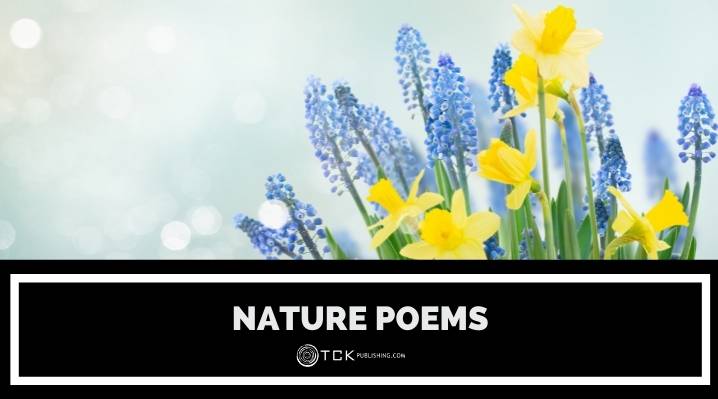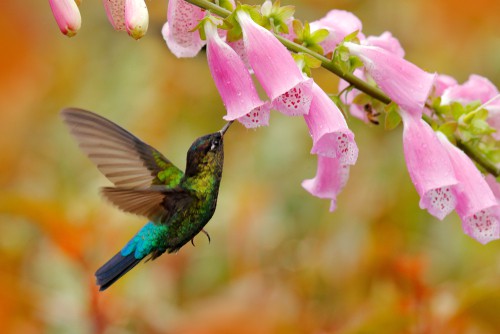
Nature has long been the muse of many famous and aspiring poets. It’s hard not to find inspiration in the natural world, as its awesome power can both give and take life, while its cycles provide no shortage of parallels to our own lives.
In this post, we’ll explore 12 of the best poems that celebrate and reflect on nature, including classics by Robert Frost, as well as more contemporary titles.
Inspiring Nature Poems
Below are 12 poems that explore the beauty, power, and wisdom of nature.
1. “Putting in the Seed” by Robert Frost
In this poem, Robert Frost uses the act of planting a seed as a metaphor for creating life and giving birth.
You come to fetch me from my work to-night
When supper’s on the table, and we’ll see
If I can leave off burying the white
Soft petals fallen from the apple tree.
(Soft petals, yes, but not so barren quite,
Mingled with these, smooth bean and wrinkled pea;)
And go along with you ere you lose sight
Of what you came for and become like me,
Slave to a springtime passion for the earth.
How Love burns through the Putting in the Seed
On through the watching for that early birth
When, just as the soil tarnishes with weed,
The sturdy seedling with arched body comes
Shouldering its way and shedding the earth crumbs.
2. “South” by Natasha Trethewey
This poem by two-time United States Poet Laureate Natasha Trethewey reflects on the nature of the American South, while also pondering its history of slavery.
I returned
to land’s end, the swath of coast
clear cut and buried in sand:
mangrove, live oak, gulfweed
razed and replaced by thin palms—
palmettos—symbols of victory
or defiance, over and over
marking this vanquished land. I returned
to a field of cotton, hallowed ground—
as slave legend goes—each boll
holding the ghosts of generations…
You can read the full poem here.
3. “What I Would Like to Grow in My Garden” by Katherine Riegel
This nature poem by Katherine Riegel reminds us of the simple pleasures of planting a garden, enjoying the scent of lavender, eating a juicy tomato, or watching a bunny enter the garden to nibble on the buffet.
Lavender for the bees and because I hate
all fake lavender smells. Tomatoes to cut
and place on toasted bread for BLTs, with or without
the b and the l. I’d like, too, to plant
the sweet alyssum that smells like honey and peace,
and for it to bloom even when it’s hot,
and also lilies, so I have something left
to look at when the rabbits come.
They always come. They are
always hungry. And I think I am done
protecting one sweet thing from another.
Enjoy the full poem here.
4. “Hummingbird” by Robin Becker

In this poem, Becker’s muse is the hummingbird, which she portrays as an “emissary for the afterlife” while also reflecting on their nature, mythology, and her personal associations with the bird.
I love the whir of the creature come
to visit the pink
flowers in the hanging basket as she does
most August mornings, hours away
from starvation to store
enough energy to survive overnight.
Read the full poem here.
5. “A Sunset” by Ari Banias
In this poem, the writer contemplates a sunset and how the beauty of some things cannot be done justice through a photo.
I watch a woman take a photo
of a flowering tree with her phone.
A future where no one will look at it,
perpetual trembling which wasn’t
and isn’t. I have taken photos of a sunset.
In person, “wow” “beautiful”
but the picture can only be
as interesting as a word repeated until emptied.
I think I believe this.
Read the full poem here.
6. “Merry Autumn” by Paul Laurence Dunbar
In this tribute to autumn, Dunbar proves there’s nothing sad about this transitional season.
It’s all a farce,—these tales they tell
About the breezes sighing,
And moans astir o’er field and dell,
Because the year is dying.
Such principles are most absurd,—
I care not who first taught ’em;
There’s nothing known to beast or bird
To make a solemn autumn.
In solemn times, when grief holds sway
With countenance distressing,
You’ll note the more of black and gray
Will then be used in dressing.
Now purple tints are all around;
The sky is blue and mellow;
And e’en the grasses turn the ground
From modest green to yellow.
The seed burrs all with laughter crack
On featherweed and jimson;
And leaves that should be dressed in black
Are all decked out in crimson.
A butterfly goes winging by;
A singing bird comes after;
And Nature, all from earth to sky,
Is bubbling o’er with laughter.
The ripples wimple on the rills,
Like sparkling little lasses;
The sunlight runs along the hills,
And laughs among the grasses.
The earth is just so full of fun
It really can’t contain it;
And streams of mirth so freely run
The heavens seem to rain it.
Don’t talk to me of solemn days
In autumn’s time of splendor,
Because the sun shows fewer rays,
And these grow slant and slender.
Why, it’s the climax of the year,—
The highest time of living!—
Till naturally its bursting cheer
Just melts into thanksgiving.
7. “Shook Foil” by Kwame Dawes
This poem, set in Jamaica, contrasts the beauty and gifs of nature with the modern world and “drier staleness of the road that leads to the waiting city of fluorescent lights.”
The whole earth is filled with the love of God.
In the backwoods, the green light
is startled by blossoming white petals,
soft pathways for the praying bird
dipping into the nectar, darting in starts
among the tangle of bush and trees.
My giddy walk through this speckled grotto
is drunk with the slow mugginess
of a reggae bassline, finding its melody
in the mellow of the soft earth’s breath.
Enjoy the full poem here.
8. “The Sun” by Dan Chiasson
Here, the poet compares the absolute power of the sun to that of a god, and reflects on its ability to parch the soil, or “hide perpetually behind a veil.”
There is one mind in all of us, one soul,
who parches the soil in some nations
but in others hides perpetually behind a veil;
he spills light everywhere, here he spilled
some on my tie, but it dried before dinner ended.
He is in charge of darkness also, also
in charge of crime, in charge of the imagination.
Read the full poem here.
9. “Water” by Ralph Waldo Emerson
Much like Chiasson’s “The Sun,” this poem by Ralph Waldo Emerson looks at water’s ability to give life but also destroy.
The water understands
Civilization well;
It wets my foot, but prettily,
It chills my life, but wittily,
It is not disconcerted,
It is not broken-hearted:
Well used, it decketh joy,
Adorneth, doubleth joy:
Ill used, it will destroy,
In perfect time and measure
With a face of golden pleasure
Elegantly destroy.
10. “There Will Come Soft Rains” by Sara Teasdale
Sara Teasdale wrote this poem during the 1918 flu pandemic and World War I. It expresses hope that nature will again bring brighter times.
(War Time)
There will come soft rains and the smell of the ground,
And swallows circling with their shimmering sound;
And frogs in the pools singing at night,
And wild plum trees in tremulous white,
Robins will wear their feathery fire
Whistling their whims on a low fence-wire;
And not one will know of the war, not one
Will care at last when it is done.
Not one would mind, neither bird nor tree
If mankind perished utterly;
And Spring herself, when she woke at dawn,
Would scarcely know that we were gone.
11. “I Wandered Lonely As a Cloud” by William Wordsworth

Inspired by a long belt of daffodils he happened upon with his sister, this poem by Wordsworth captures the immense beauty of something so simple, and its ability to make anyone who sees it happy.
I wandered lonely as a cloud
That floats on high o’er vales and hills,
When all at once I saw a crowd,
A host, of golden daffodils;
Beside the lake, beneath the trees,
Fluttering and dancing in the breeze.
Continuous as the stars that shine
And twinkle on the milky way,
They stretched in never-ending line
Along the margin of a bay:
Ten thousand saw I at a glance,
Tossing their heads in sprightly dance.
The waves beside them danced; but they
Out-did the sparkling waves in glee:
A poet could not but be gay,
In such a jocund company:
I gazed—and gazed—but little thought
What wealth the show to me had brought:
For oft, when on my couch I lie
In vacant or in pensive mood,
They flash upon that inward eye
Which is the bliss of solitude;
And then my heart with pleasure fills,
And dances with the daffodils.
12. “Nothing Gold Can Stay” by Robert Frost
This iconic poem by Robert Frost reminds us that everything beautiful is fleeting, which makes it all the more precious when it’s here.
Nature’s first green is gold,
Her hardest hue to hold.
Her early leaf’s a flower;
But only so an hour.
Then leaf subsides to leaf.
So Eden sank to grief,
So dawn goes down to day.
Nothing gold can stay.
What Is a Nature Poem Called?
A type of poem that frequently deals with nature is the haiku. This poem of Japanese origins traditionally uses nature as its subject, although contemporary haikus can be written on any theme.
Want to try your hand at writing one yourself? Check out our post on how to write a haiku and challenge yourself to write about the nature you find around you!
Do you have a favorite nature poem? Share it with us in the comments below!
If you enjoyed this post, then you might also like:
- 8 Famous Langston Hughes Poems
- 14 Feminist Poems to Inspire Strong Women
- 7 Mary Oliver Poems That Will Make You Appreciate Nature
- How to Write a Haiku: Tips for Brief, Beautiful Poems
As a blog writer for TCK Publishing, Kaelyn loves crafting fun and helpful content for writers, readers, and creative minds alike. She has a degree in International Affairs with a minor in Italian Studies, but her true passion has always been writing. Working remotely allows her to do even more of the things she loves, like traveling, cooking, and spending time with her family.
